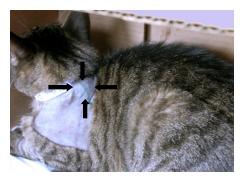July is Sarcoma Awareness Month

July is Sarcoma Awareness Month
Both veterinary and human oncologists talk about three big families of cancer: carcinomas, sarcomas and tumors of the blood and lymphatic system. Carcinomas frequently originate from glands – like breast or prostate carcinomas. The most well-known tumors of the blood and immune system are leukemia and lymphoma. Sarcoma is a form of cancer arising from bones, tendons, muscles, nerves, joints, blood vessels and fat. Over 13,000 Americans were diagnosed with sarcoma in 2013. Sarcomas are rare in adults, but represent 15% of all childhood cancers.
Pets Get Sarcomas Too
Cancer registries for pets exist, but recording the types of cancer pets have is not mandatory as it is for human cancer diagnoses. Some information about the occurrence of sarcomas in pets has been published. In a survey of Greek dogs with skin cancer, 40% of the tumors were sarcomas, the two most common were mast cell tumors and fibrosarcoma. A study of American dogs found the mast cell tumor was the most common malignant tumor on this side of the Atlantic as well. An Italian tumor registry based out of Genoa found sarcomas occurred more commonly as a dog aged. Breed also influences the development of sarcomas. A survey of flat coated retrievers in the United Kingdom found 55% of malignant tumors and 26% of all tumors in this breed were sarcomas.
Common Dog Tumors with the Last Name Sarcoma
Osteosarcoma (bone sarcoma) is ten times more common in dogs than in humans. Large and giant breed dogs have a greater risk of developing osteosarcoma. In dogs, the tumor destroys the bone (see the above photograph) and to control pain, amputation is often recommended; although limb-sparing surgery and radiation therapy are also used to control pain. Coupling surgery or radiation with systemic chemotherapy helps to control the spread of osteosarcoma and thus prolongs survival.
Hemangiosarcoma is a tumor of blood vessels. Because the vessels are cancerous, they rupture easily and dogs with hemangiosarcoma frequently end up in the animal ER with catastrophic hemorrhage from a ruptured tumor in their spleen, liver or heart.
Soft tissue sarcomas include tumors whose name is a mouthful like hemangiopericytoma, or that sound like a more benign tumor, such as the nerve sheath tumor. Soft tissue sarcomas are a mixed group of tumors frequently of the skin and often lumped together because of a similar clinical course. These tumors send tentacles of tumor out into the surrounding tissue, making complete removal challenging. Successful surgical removal of a soft tissue sarcoma requires a much bigger incision than most dog owners expect in order to remove the tentacles. If residual tumor is left behind, these tumors commonly recur and may require radiation therapy to control.
Cat Tumors with the Last Name Sarcoma
An injection site sarcoma is a very specific type of sarcoma, most commonly found in cats where injections are administered, such as a vaccination or insulin injection. When these tumors develop on the nape of the neck (as in the photograph on the right) or on the hip, they are very difficult to completely remove and they recur much more frequently than soft tissue sarcomas of dogs. Most patients need follow up with radiation therapy, and because 25-40% of these tumors metastasize, chemotherapy as well.
Raising Sarcoma Awareness
- Osteosarcoma causes bone pain and limping. Don’t assume your limping dog has a bum knee or weak ankles. Have your limping pet seen by your veterinarian.
- Soft tissue sarcomas and injection site sarcomas often start as a skin lump. See your veterinarian for any lump that is enlarging over a month, is larger than 2 cm (3/4 inch) in diameter, or has been present for more than 3 months.
- Sarcomas can often be diagnosed based on a fine needle aspirate. Help your veterinarian take the best care possible of your pet and allow this simple procedure if it is recommended.

































